- Home
- L. M. Montgomery
Emily of New Moon
Emily of New Moon Read online
Copyright (c) 2011 Heirs of L. M. Montgomery Inc.
Introduction copyright (c) 2014 by Kate Macdonald Butler Cover and internal design (c) 2014 by Sourcebooks, Inc.
Cover design by The Book Designers
Cover illustration by Jacqui Oakley, jacquioakley.com
L. M. Montgomery is a trademark of Heirs of L. M. Montgomery Inc.
Sourcebooks and the colophon are registered trademarks of Sourcebooks, Inc.
All rights reserved. No part of this book may be reproduced in any form or by any electronic or mechanical means including information storage and retrieval systems--except in the case of brief quotations embodied in critical articles or reviews--without permission in writing from its publisher, Sourcebooks, Inc.
The characters and events portrayed in this book are fictitious or are used fictitiously. Any similarity to real persons, living or dead, is purely coincidental and not intended by the author.
Published by Sourcebooks Fire, an imprint of Sourcebooks, Inc.
P.O. Box 4410, Naperville, Illinois 60567-4410
(630) 961-3900
Fax: (630) 961-2168
www.sourcebooks.com
Original copyright (c) 1923 Frederick A. Stokes Company (USA) Library of Congress Cataloging-in-Publication data is on file with the publisher.
Contents
Front Cover
Title Page
Copyright
Introduction
Chapter 1: The House in the Hollow
Chapter 2: A Watch in the Night
Chapter 3: A Hop out of Kin
Chapter 4: A Family Conclave
Chapter 5: Diamond Cut Diamond
Chapter 6: New Moon
Chapter 7: The Book of Yesterday
Chapter 8: Trial by Fire
Chapter 9: A Special Providence
Chapter 10: Growing Pains
Chapter 11: Ilse
Chapter 12: The Tansy Patch
Chapter 13: A Daughter of Eve
Chapter 14: Fancy Fed
Chapter 15: Various Tragedies
Chapter 16: Check for Miss Brownell
Chapter 17: Living Epistles
Chapter 18: Father Cassidy
Chapter 19: Friends Again
Chapter 20: By Aerial Post
Chapter 21: "Romantic but not Comfortable"
Chapter 22: Wyther Grange
Chapter 23: Deals with Ghosts
Chapter 24: A Different Kind of Happiness
Chapter 25: "She Couldn't Have Done It"
Chapter 26: On the Bay Shore
Chapter 27: The Vow of Emily
Chapter 28: A Weaver of Dreams
Chapter 29: Sacrilege
Chapter 30: When the Curtain Lifted
Chapter 31: Emily's Great Moment
About the Author
Back Cover
To Mr. George Boyd Macmillan
Alloa, Scotland
in recognition of a long and stimulating friendship
Introduction
I was delighted to be asked to write an introduction to the new Sourcebooks edition of the Emily Trilogy--Emily of New Moon, Emily Climbs, and Emily's Quest, written by my grandmother L. M. Montgomery. The Emily books were a departure for L. M. Montgomery after penning the phenomenally successful Anne of Green Gables novel and its sequels. Both series feature sensitive and eloquent heroines, but Emily Byrd Starr is a more serious heroine than Anne Shirley, and her contemplative, introspective nature is a contrast to Anne's impetuous and more high-spirited personality.
The Emily books were the personal favorite of my father, Stuart, of all his mother's novels, and L. M. Montgomery's favorite creation was Emily Byrd Starr. She has been quoted as saying, "People were never right in saying I was Anne, but in some respects, they will be right if they write me down as Emily."
Both L. M. Montgomery and Emily Byrd Starr were voracious letter writers and journal keepers with driven and creative natures. Both had to overcome isolation and loneliness and the loss of their mothers, and both developed strong and independent voices as their writing matured. In a letter responding to a devoted fan of Emily of New Moon, my grandmother wrote, "I'm glad you like Emily, because she is my own favorite. She is purely a creature of my imagination but a good deal of my own inner life in childhood and girlhood went into her."
L. M. Montgomery wrote Emily of New Moon, Emily Climbs, and most of Emily's Quest while she was living in Leaskdale, Ontario, where my grandfather, the Reverend Ewan Macdonald, was the Presbyterian Minister from 1911 to 1926. Leaskdale was a prosperous farming community north of Toronto, and I can only imagine how busy my grandmother's life must have been as the mother of two lively young sons--my father Stuart and his older brother Chester--and as an active minister's wife living in the Manse. She was a reliable and engaged member of the Leaskdale village life, well known for her hostessing, cooking, embroidery, photography, and gardening skills. During the years in Leaskdale that she wrote the Emily books (and eight other novels), she was also the first Canadian woman to become a Fellow of the Royal Society of Arts and Letters of England, she was a member of the Canadian Authors' Association, and the Canadian Women's Press Club.
Additionally, it was during these years in Leaskdale that my grandfather suffered from mental health issues, and she was likely preoccupied with putting forward a "good face" for the parishioners in order to maintain their stable reputation within the community.
Emily Byrd Starr is a determined, intelligent, and creative soul and I am sure that the imagined "kindred spirit" of Emily's friendship was of great comfort to my grandmother in her daily writing and a welcome break from the ongoing stresses of her real life. I recall my father telling me that, as a little boy in Leaskdale, he was not allowed to disturb his mother when she was doing her daily writing. He remembers slipping little notes and flowers cut from their garden under the crack of her study door to get her attention.
So many of the adults in the Emily books are troubled, narrow-minded, and unkind, although some ultimately do have vulnerable and surprisingly compassionate sides to their personalities. The Emily books are full of longing, mystery, lush descriptions of landscape, humor, heartbreak and sadness and I understand why my grandmother acknowledged that "they will be right if they write me down as Emily."
It is my sincere hope that a new generation of readers will be inspired and moved by these new editions of Emily of New Moon, Emily Climbs, and Emily's Quest, written by one of the world's most beloved writers, my grandmother, L. M. Montgomery.
Kate Macdonald Butler
Daughter of the late Dr. Stuart Macdonald
May 2013
CHAPTER 1
The House in the Hollow
The house in the hollow was "a mile from anywhere"--so Maywood people said. It was situated in a grassy little dale, looking as if it had never been built like other houses but had grown up there like a big, brown mushroom. It was reached by a long, green lane and almost hidden from view by an encircling growth of young birches. No other house could be seen from it although the village was just over the hill. Ellen Greene said it was the lonesomest place in the world and vowed that she wouldn't stay there a day if it wasn't that she pitied the child.
Emily didn't know she was being pitied and didn't know what lonesomeness meant. She had plenty of company. There was Father--and Mike--and Saucy Sal. The Wind Woman was always around; and there were the trees--Adam-and-Eve, and the Rooster Pine, and all the friendly lady-birches.
And there was "the flash," too. She never knew when it might come, and the possibility of it kept her a-thrill and expectant.
Emily had slipped away in the chilly twilight for a walk. She remembered that walk very vividly all her life--perhaps because of
a certain eerie beauty that was in it--perhaps because "the flash" came for the first time in weeks--more likely because of what happened after she came back from it.
It had been a dull, cold day in early May, threatening to rain but never raining. Father had lain on the sitting room lounge all day. He had coughed a good deal and he had not talked much to Emily, which was a very unusual thing for him. Most of the time he lay with his hands clasped under his head and his large, sunken, dark-blue eyes fixed dreamily and unseeingly on the cloudy sky that was visible between the boughs of the two big spruces in the front yard--Adam-and-Eve, they always called those spruces, because of a whimsical resemblance Emily had traced between their position, with reference to a small apple tree between them, and that of Adam and Eve and the Tree of Knowledge in an old-fashioned picture in one of Ellen Greene's books. The Tree of Knowledge looked exactly like the squat little apple tree, and Adam and Eve stood up on either side as stiffly and rigidly as did the spruces.
Emily wondered what Father was thinking of, but she never bothered him with questions when his cough was bad. She only wished she had somebody to talk to. Ellen Greene wouldn't talk that day either. She did nothing but grunt, and grunts meant that Ellen was disturbed about something. She had grunted last night after the doctor had whispered to her in the kitchen, and she had grunted when she gave Emily a bedtime snack of bread and molasses. Emily did not like bread and molasses, but she ate it because she did not want to hurt Ellen's feelings. It was not often that Ellen allowed her anything to eat before going to bed, and when she did it meant that for some reason or other she wanted to confer a special favor.
Emily expected the grunting attack would wear off overnight, as it generally did; but it had not, so no company was to be found in Ellen. Not that there was a great deal to be found at any time. Douglas Starr had once, in a fit of exasperation, told Emily that "Ellen Greene was a fat, lazy old thing of no importance," and Emily, whenever she looked at Ellen after that, thought the description fitted her to a hair.
So Emily had curled herself up in the ragged, comfortable old wing-chair and read The Pilgrim's Progress all the afternoon. Emily loved The Pilgrim's Progress. Many a time had she walked the straight and narrow path with Christian and Christiana--although she never liked Christiana's adventures half as well as Christian's. For one thing, there was always such a crowd with Christiana. She had not half the fascination of that solitary, intrepid figure who faced all alone the shadows of the Dark Valley and the encounter with Apollyon. Darkness and hobgoblins were nothing when you had plenty of company. But to be alone--ah, Emily shivered with the delicious horror if it!
When Ellen announced that supper was ready Douglas Starr told Emily to go out to it.
"I don't want anything tonight. I'll just lie here and rest. And when you come in again we'll have a real talk, Elfkin."
He smiled up at her his old, beautiful smile, with the love behind it, that Emily always found so sweet. She ate her supper quite happily--though it wasn't a good supper. The bread was soggy and her egg was underdone, but for a wonder she was allowed to have both Saucy Sal and Mike sitting, one on each side of her, and Ellen only grunted when Emily fed them wee bits of bread and butter.
Mike had such a cute way of sitting up on his haunches and catching the bits in his paws, and Saucy Sal had her trick of touching Emily's ankle with an almost human touch when her turn was too long in coming. Emily loved them both, but Mike was her favorite. He was a handsome, dark-gray cat with huge owl-like eyes, and he was so soft and fat and fluffy. Sal was always thin; no amount of feeding put any flesh on her bones. Emily liked her, but never cared to cuddle or stroke her because of her thinness. Yet there was a sort of weird beauty about her that appealed to Emily. She was gray-and-white--very white and very sleek, with a long, pointed face, very long ears and very green eyes. She was a redoubtable fighter, and strange cats were vanquished in one round. The fearless little spitfire would even attack dogs and rout them utterly.
Emily loved her pussies. She had brought them up herself, as she proudly said. They had been given to her when they were kittens by her Sunday School teacher.
"A living present is so nice," she told Ellen, "because it keeps on getting nicer all the time."
But she worried considerably because Saucy Sal didn't have kittens.
"I don't know why she doesn't," she complained to Ellen Greene. "Most cats seem to have more kittens than they know what to do with."
After supper Emily went in and found that her father had fallen asleep. She was very glad of this; she knew he had not slept much for two nights; but she was a little disappointed that they were not going to have that "real talk." "Real" talks with Father were always such delightful things. But next best would be a walk--a lovely all-by-your-lonesome walk through the gray evening of the young spring. It was so long since she had had a walk.
"You put on your hood and mind you scoot back if it starts to rain," warned Ellen. "You can't monkey with colds the way some kids can."
"Why can't I?" Emily asked rather indignantly. Why must she be debarred from "monkeying with colds" if other children could? It wasn't fair.
But Ellen only grunted. Emily muttered under her breath for her own satisfaction, "You are a fat old thing of no importance!" and slipped upstairs to get her hood--rather reluctantly, for she loved to run bareheaded. She put the faded blue hood on over her long, heavy braid of glossy, jet-black hair, and smiled chummily at her reflection in the little greenish glass. The smile began at the corners of her lips and spread over her face in a slow, subtle, very wonderful way, as Douglas Starr often thought. It was her dead mother's smile--the thing that had caught and held him long ago when he had first seen Juliet Murray. It seemed to be Emily's only physical inheritance from her mother. In all else, he thought, she was like the Starrs--in her large, purplish-gray eyes with their very long lashes and black brows, in her high, white forehead--too high for beauty--in the delicate modeling of her pale oval face and sensitive mouth, in the little ears that were pointed just a wee bit to show that she was kin to tribes of elfland.
"I'm going for a walk with the Wind Woman, dear," said Emily. "I wish I could take you too. Do you ever get out of that room, I wonder. The Wind Woman is going to be out in the fields tonight. She is tall and misty, with thin, gray, silky clothes blowing all about her--and wings like a bat's--only you can see through them--and shining eyes like stars looking through her long, loose hair. She can fly--but tonight she will walk with me all over the fields. She's a great friend of mine--the Wind Woman is. I've known her ever since I was six. We're old, old friends--but not quite so old as you and I, little Emily-in-the-glass. We've been friends always, haven't we?"
With a blown kiss to little Emily-in-the-glass, Emily-out-of-the-glass was off.
The Wind Woman was waiting for her outside--ruffling the little spears of striped grass that were sticking up stiffly in the bed under the sitting-room window--tossing the big boughs of Adam-and-Eve--whispering among the misty green branches of the birches--teasing the "Rooster Pine" behind the house--it really did look like an enormous, ridiculous rooster, with a huge, bunchy tail and a head thrown back to crow.
It was so long since Emily had been out for a walk that she was half crazy with the joy of it. The winter had been so stormy and the snow so deep that she was never allowed out; April had been a month of rain and wind; so on this May evening she felt like a released prisoner. Where should she go? Down the brook--or over the fields to the spruce barrens? Emily chose the latter.
She loved the spruce barrens, away at the further end of the long, sloping pasture. That was a place where magic was made. She came more fully into her fairy birthright there than in any other place. Nobody who saw Emily skimming over the bare field would have envied her. She was little and pale and poorly clad; sometimes she shivered in her thin jacket; yet a queen might have gladly given a crown for her visions--her dreams of wonder. The brown, frosted grasses under her feet were velvet piles. The
old, mossy, gnarled half-dead spruce tree, under which she paused for a moment to look up into the sky, was a marble column in a palace of the gods; the far dusky hills were the ramparts of a city of wonder. And for companions she had all the fairies of the countryside--for she could believe in them here--the fairies of the white clover and satin catkins, the little green folk of the grass, the elves of the young fir trees, sprites of wind and wild fern and thistledown. Anything might happen there--everything might come true.
And the barrens were such a splendid place in which to play hide and seek with the Wind Woman. She was so very real there; if you could just spring quickly enough around a little cluster of spruces--only you never could--you would see her as well as feel her and hear her. There she was--that was the sweep of her gray cloak--no, she was laughing up in the very top of the taller trees--and the chase was on again--till, all at once, it seemed as if the Wind Woman were gone--and the evening was bathed in a wonderful silence--and there was a sudden rift in the curdled clouds westward, and a lovely, pale, pinky-green lake of sky with a new moon in it.
Emily stood and looked at it with clasped hands and her little black head upturned. She must go home and write down a description of it in the yellow account book, where the last thing written had been, "Mike's Biograffy" It would hurt her with its beauty until she wrote it down. Then she would read it to Father. She must not forget how the tips of the trees on the hill came out like fine black lace across the edge of the pinky-green sky.
And then, for one glorious, supreme moment, came "the flash."
Emily called it that, although she felt that the name didn't exactly describe it. It couldn't be described--not even to Father, who always seemed a little puzzled by it. Emily never spoke of it to anyone else.
It had always seemed to Emily, ever since she could remember, that she was very, very near to a world of wonderful beauty. Between it and herself hung only a thin curtain; she could never draw the curtain aside--but sometimes, just for a moment, a wind fluttered it and then it was as if she caught a glimpse of the enchanting realm beyond--only a glimpse--and heard a note of unearthly music.
This moment came rarely--went swiftly, leaving her breathless with the inexpressible delight of it. She could never recall it--never summon it--never pretend it; but the wonder of it stayed with her for days. It never came twice with the same thing. Tonight the dark boughs against that far-off sky had given it. It had come with a high, wild note of wind in the night, with a shadow wave over a ripe field, with a graybird lighting on her window-sill in a storm, with the singing of "Holy, holy, holy" in church, with a glimpse of the kitchen fire when she had come home on a dark autumn night, with the spirit-like blue of ice palms on a twilit pane, with a felicitous new word when she was writing down a "description" of something. And always when the flash came to her Emily felt that life was a wonderful, mysterious thing of persistent beauty.

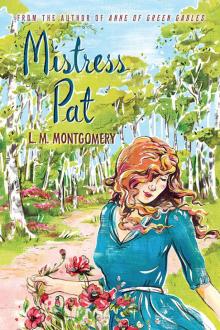 Mistress Pat
Mistress Pat A Tangled Web
A Tangled Web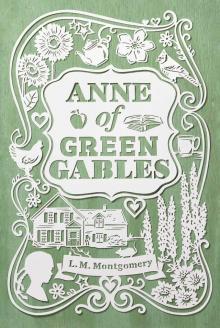 Anne of Green Gables
Anne of Green Gables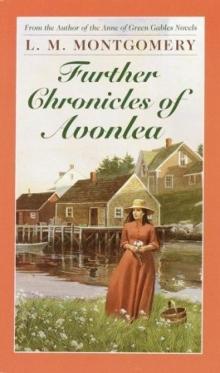 Further Chronicles of Avonlea
Further Chronicles of Avonlea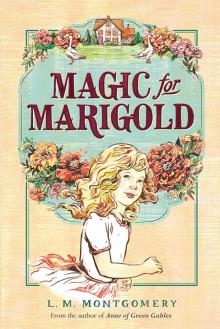 Magic for Marigold
Magic for Marigold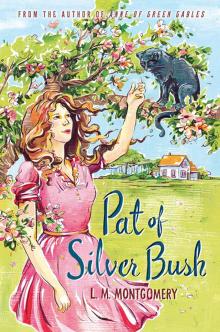 Pat of Silver Bush
Pat of Silver Bush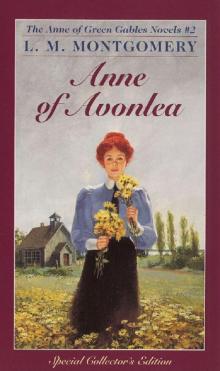 Anne of Avonlea
Anne of Avonlea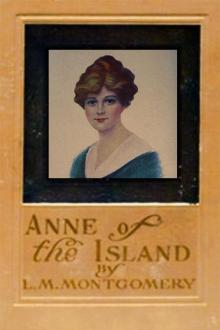 Anne of the Island
Anne of the Island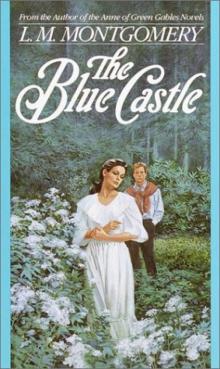 The Blue Castle
The Blue Castle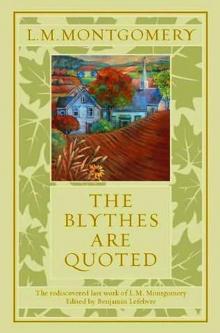 The Blythes Are Quoted
The Blythes Are Quoted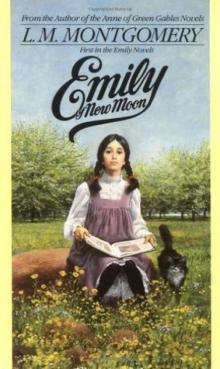 Emily of New Moon
Emily of New Moon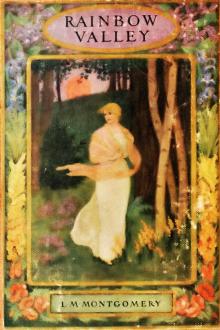 Rainbow Valley
Rainbow Valley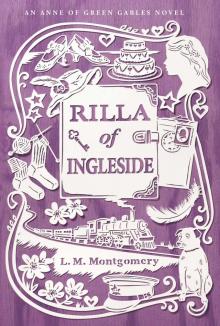 Rilla of Ingleside
Rilla of Ingleside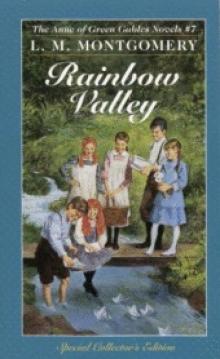 07 - Rainbow Valley
07 - Rainbow Valley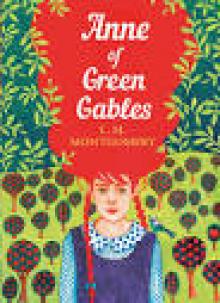 Anne of Green Gables (Penguin)
Anne of Green Gables (Penguin)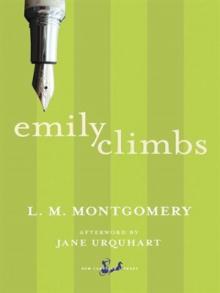 Emily Climbs
Emily Climbs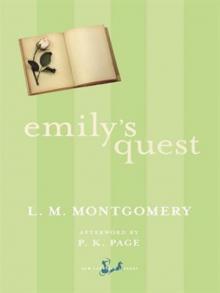 Emily's Quest
Emily's Quest A Name for Herself
A Name for Herself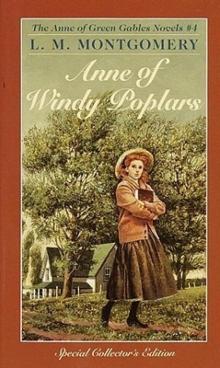 Anne of Windy Poplars
Anne of Windy Poplars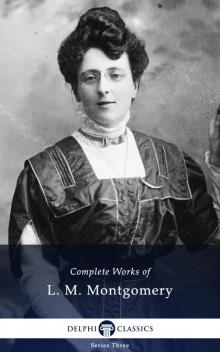 The Complete Works of L M Montgomery
The Complete Works of L M Montgomery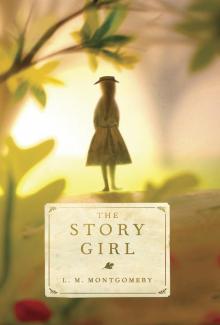 The Story Girl
The Story Girl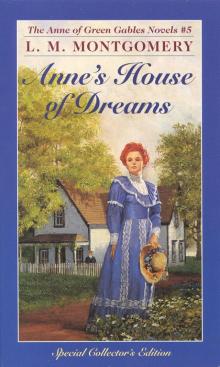 Anne's House of Dreams
Anne's House of Dreams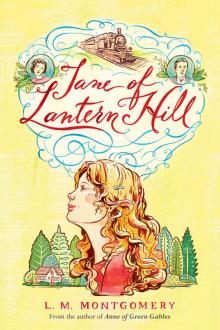 Jane of Lantern Hill
Jane of Lantern Hill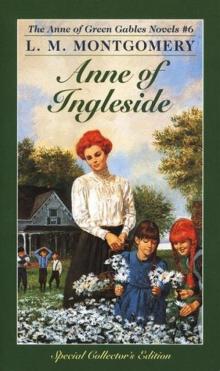 Anne of Ingleside
Anne of Ingleside